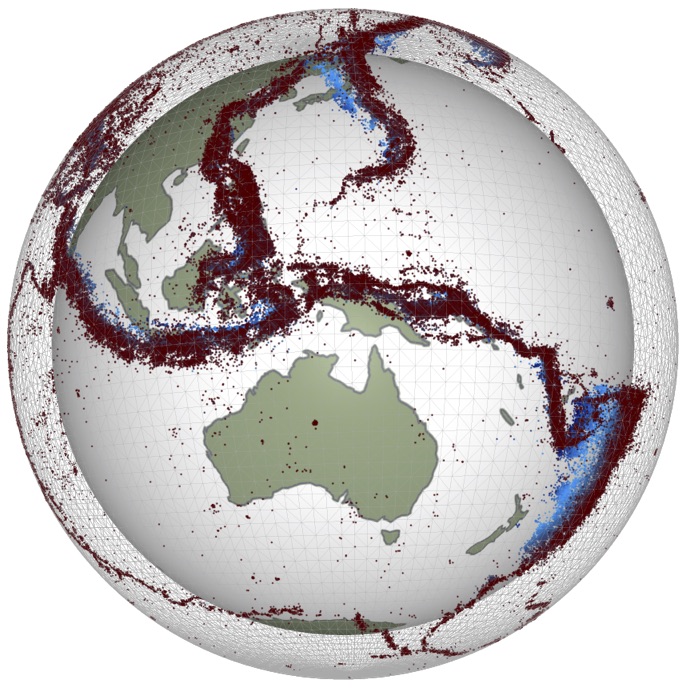Constant viscosity convection, Cartesian domain (benchmark)#
This is a simple example in which we try to instantiate two solvers on the mesh and have them use a common set of variables.
We set up a v, p, T system in which we will solve for a steady-state T field in response to thermal boundary conditions and then use the steady-state T field to compute a stokes flow in response.
The next step is to add particles at node points and sample back along the streamlines to find values of the T field at a previous time.
(Note, we keep all the pieces from previous increments of this problem to ensure that we don’t break something along the way)
# to fix trame issue
import nest_asyncio
nest_asyncio.apply()
import petsc4py
from petsc4py import PETSc
import underworld3 as uw
from underworld3.systems import Stokes
from underworld3 import function
import numpy as np
import sympy
meshbox = uw.meshing.UnstructuredSimplexBox(
minCoords=(0.0, 0.0),
maxCoords=(1.0, 1.0),
cellSize=1.0 / 32.0,
regular=True,
)
meshbox.dm.view()
import sympy
# Some useful coordinate stuff
x = meshbox.N.x
y = meshbox.N.y
# check the mesh if in a notebook / serial
if uw.mpi.size == 1:
import pyvista as pv
import underworld3.visualisation as vis
pvmesh = vis.mesh_to_pv_mesh(meshbox)
pl = pv.Plotter(window_size=(750, 750))
# pl.add_mesh(pvmesh,'Black', 'wireframe', opacity=0.5)
pl.add_mesh(pvmesh, edge_color="Black", show_edges=True)
pl.show(cpos="xy")
v_soln = uw.discretisation.MeshVariable("U", meshbox, meshbox.dim, degree=2)
p_soln = uw.discretisation.MeshVariable("P", meshbox, 1, degree=1)
t_soln = uw.discretisation.MeshVariable("T", meshbox, 1, degree=3)
t_0 = uw.discretisation.MeshVariable("T0", meshbox, 1, degree=3)
swarm = uw.swarm.Swarm(mesh=meshbox)
T1 = uw.swarm.SwarmVariable("Tminus1", swarm, 1, proxy_degree=3)
swarm.populate(fill_param=5)
ad = uw.systems.AdvDiffusion(meshbox, t_soln, T1.sym, order=3)
ad._u_star_projector.smoothing = 0.0
ad.add_dirichlet_bc(1.0, "Bottom")
ad.add_dirichlet_bc(0.0, "Top")
init_t = 0.01 * sympy.sin(5.0 * x) * sympy.sin(np.pi * y) + (1.0 - y)
with meshbox.access(t_0, t_soln):
t_0.data[...] = uw.function.evaluate(init_t, t_0.coords).reshape(-1, 1)
t_soln.data[...] = t_0.data[...]
with swarm.access(T1):
T1.data[...] = uw.function.evaluate(
init_t, swarm.particle_coordinates.data
).reshape(-1, 1)
# Create Stokes object
stokes = Stokes(
meshbox,
velocityField=v_soln,
pressureField=p_soln,
u_degree=v_soln.degree,
p_degree=p_soln.degree,
solver_name="stokes",
verbose=False,
)
# Set solve options here (or remove default values
# stokes.petsc_options.getAll()
stokes.petsc_options.delValue("ksp_monitor")
# Constant visc
stokes.constitutive_model = uw.constitutive_models.ViscousFlowModel(meshbox.dim)
stokes.constitutive_model.Parameters.viscosity = 1
# Velocity boundary conditions
stokes.add_dirichlet_bc((0.0,), "Left", (0,))
stokes.add_dirichlet_bc((0.0,), "Right", (0,))
stokes.add_dirichlet_bc((0.0,), "Top", (1,))
stokes.add_dirichlet_bc((0.0,), "Bottom", (1,))
buoyancy_force = 1.0e6 * t_soln.fn
stokes.bodyforce = meshbox.N.j * buoyancy_force
# check the stokes solve is set up and that it converges
stokes.solve()
# check the projection
if uw.mpi.size == 1 and ad.projection:
import pyvista as pv
import underworld3.visualisation as vis
pvmesh = vis.mesh_to_pv_mesh(meshbox)
pvmesh.point_data["T1"] = vis.scalar_fn_to_pv_points(pvmesh, T1.sym)
pvmesh.point_data["mT1"] = vis.scalar_fn_to_pv_points(pvmesh, ad._u_star_projected.sym)
pvmesh.point_data["dT1"] = vis.scalar_fn_to_pv_points(pvmesh, T1.sym) - vis.scalar_fn_to_pv_points(pvmesh, ad._u_star_projected.sym)
velocity_points = vis.meshVariable_to_pv_cloud(stokes.u)
velocity_points.point_data["V"] = vis.vector_fn_to_pv_points(velocity_points, stokes.u.sym)
pl = pv.Plotter(window_size=(750, 750))
# pl.add_mesh(pvmesh,'Black', 'wireframe')
pl.add_mesh(
pvmesh,
cmap="coolwarm",
edge_color="Black",
show_edges=True,
scalars="dT1",
use_transparency=False,
opacity=0.5,
)
# pl.add_arrows(arrow_loc, arrow_length, mag=1.0e-4, opacity=0.5)
# pl.add_arrows(arrow_loc2, arrow_length2, mag=1.0e-1)
# pl.add_points(pdata)
pl.show(cpos="xy")
def plot_T_mesh(filename):
if uw.mpi.size == 1:
import pyvista as pv
import underworld3.visualisation as vis
pvmesh = vis.mesh_to_pv_mesh(meshbox)
pvmesh.point_data["T"] = vis.scalar_fn_to_pv_points(pvmesh, t_soln.sym)
tpoints = vis.meshVariable_to_pv_cloud(t_soln)
tpoints.point_data["T"] = vis.scalar_fn_to_pv_points(tpoints, t_soln.sym)
tpoint_cloud = pv.PolyData(tpoints)
spoints = vis.swarm_to_pv_cloud(swarm)
swarm_point_cloud = pv.PolyData(spoints)
with swarm.access():
swarm_point_cloud.point_data["T1"] = T1.data.copy()
velocity_points = vis.meshVariable_to_pv_cloud(stokes.u)
velocity_points.point_data["V"] = vis.vector_fn_to_pv_points(velocity_points, stokes.u.sym)
pl = pv.Plotter(window_size=(750, 750))
pl.add_arrows(velocity_points.points, velocity_points.point_data["V"], mag=0.00001, opacity=0.75)
pl.add_points(
swarm_point_cloud, # cmap="RdYlBu_r", scalars="T1",
color="Black",
render_points_as_spheres=True,
clim=[0.0, 1.0],
point_size=1.0,
opacity=0.5,
)
pl.add_points(
point_cloud,
cmap="coolwarm",
scalars="T",
render_points_as_spheres=False,
clim=[0.0, 1.0],
point_size=10.0,
opacity=0.66,
)
# pl.add_mesh(pvmesh, cmap="coolwarm", edge_color="Black",
# show_edges=True, scalars="T",clim=[0.0,1.0],
# use_transparency=False, opacity=0.5)
pl.remove_scalar_bar("T")
# pl.remove_scalar_bar("T1")
pl.screenshot(
filename="{}.png".format(filename),
window_size=(1250, 1250),
return_img=False,
)
# pl.show()
pl.close()
# Convection model / update in time
expt_name = "output/Ra1e6_swarm_pnots"
ad_delta_t = 0.000033 # target
for step in range(0, 2): #250
stokes.solve(zero_init_guess=False)
stokes_delta_t = 5.0 * stokes.estimate_dt()
delta_t = stokes_delta_t
ad.solve(timestep=delta_t, zero_init_guess=True)
# update swarm / swarm variables
with swarm.access(T1):
T1.data[:, 0] = uw.function.evaluate(t_soln.fn, swarm.particle_coordinates.data)
# advect swarm
swarm.advection(v_soln.fn, delta_t)
tstats = t_soln.stats()
tstarstats = T1._meshVar.stats()
if uw.mpi.rank == 0:
print("Timestep {}, dt {}".format(step, delta_t))
print(tstats[2], tstats[3])
print(tstarstats[2], tstarstats[3])
plot_T_mesh(filename="{}_step_{}".format(expt_name, step))
# savefile = "{}_ts_{}.h5".format(expt_name,step)
# meshbox.save(savefile)
# v_soln.save(savefile)
# t_soln.save(savefile)
# meshbox.generate_xdmf(savefile)
savefile = “output_conv/convection_cylinder.h5”.format(step) meshbox.save(savefile) v_soln.save(savefile) t_soln.save(savefile) meshbox.generate_xdmf(savefile)
if uw.mpi.size == 1:
import pyvista as pv
import underworld3.visualisation as vis
pvmesh = vis.mesh_to_pv_mesh(meshbox)
pvmesh.point_data["T"] = vis.scalar_fn_to_pv_points(pvmesh, t_soln.sym)
tpoints = vis.meshVariable_to_pv_cloud(t_soln)
tpoints.point_data["T"] = vis.scalar_fn_to_pv_points(tpoints, t_soln.sym)
tpoint_cloud = pv.PolyData(tpoints)
spoints = vis.swarm_to_pv_cloud(swarm)
swarm_point_cloud = pv.PolyData(spoints)
with swarm.access():
swarm_point_cloud.point_data["T1"] = T1.data.copy()
velocity_points = vis.meshVariable_to_pv_cloud(stokes.u)
velocity_points.point_data["V"] = vis.vector_fn_to_pv_points(velocity_points, stokes.u.sym)
pl = pv.Plotter(window_size=(750, 750))
pl.add_arrows(velocity_points.points, velocity_points.point_data["V"], mag=0.00002, opacity=0.75)
# pl.add_arrows(arrow_loc2, arrow_length2, mag=1.0e-1)
# pl.add_points(point_cloud, cmap="coolwarm",
# render_points_as_spheres=True,
# point_size=7.5, opacity=0.25
# )
pl.add_points(
swarm_point_cloud,
cmap="coolwarm",
render_points_as_spheres=True,
point_size=2.5,
opacity=0.5,
clim=[0.0, 1.0],
)
pl.add_mesh(
pvmesh,
cmap="coolwarm",
edge_color="Black",
show_edges=True,
scalars="T",
use_transparency=False,
opacity=0.5,
clim=[0.0, 1.0],
)
pl.show(cpos="xy")
